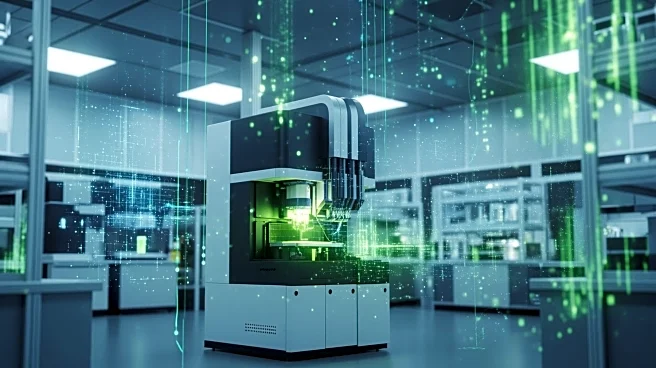What's Happening?
AlphaDIA, a new computational tool, is revolutionizing the field of proteomics by enabling data-independent acquisition (DIA) transfer learning for feature-free proteomics. This approach allows for the systematic
sequencing of peptides, enhancing dynamic range and acquisition speed. AlphaDIA optimizes retention time, ion mobility, and mass-to-charge ratios, improving the confidence in peptide identifications. The tool employs a two-step scoring machine learning algorithm to identify peak groups, using convolution kernels and supervised classification to enhance accuracy. This development marks a significant advancement in the use of artificial intelligence and computational techniques in protein sequencing, offering deeper insights into proteome analysis.
Why It's Important?
The introduction of AlphaDIA in protein sequencing is significant for the biotechnology and healthcare industries, as it offers a more efficient and accurate method for analyzing complex proteomes. By improving the dynamic range and acquisition speed, AlphaDIA can potentially accelerate research in drug development and personalized medicine. The tool's ability to optimize search parameters and reduce false identifications enhances the reliability of proteomic data, which is crucial for understanding disease mechanisms and developing targeted therapies. Stakeholders in the pharmaceutical and biotech sectors stand to benefit from these advancements, as they can lead to more precise biomarker discovery and therapeutic interventions.
What's Next?
AlphaDIA's implementation may lead to broader adoption of DIA techniques in proteomics, encouraging further research and development in computational biology. As the tool gains traction, it is likely that more laboratories will integrate AlphaDIA into their workflows, potentially leading to new discoveries in protein function and interaction. The continued refinement of this technology could also spur collaborations between computational scientists and biologists, fostering innovation in the field. Future updates to AlphaDIA may include enhanced machine learning models and expanded capabilities for analyzing diverse biological samples.
Beyond the Headlines
The ethical implications of using advanced AI in proteomics include concerns about data privacy and the potential for bias in algorithmic predictions. As AlphaDIA and similar technologies become more prevalent, it is essential to address these issues to ensure equitable access to scientific advancements. Additionally, the cultural shift towards integrating AI in biological research may require new educational initiatives to equip scientists with the necessary skills to leverage these tools effectively.










